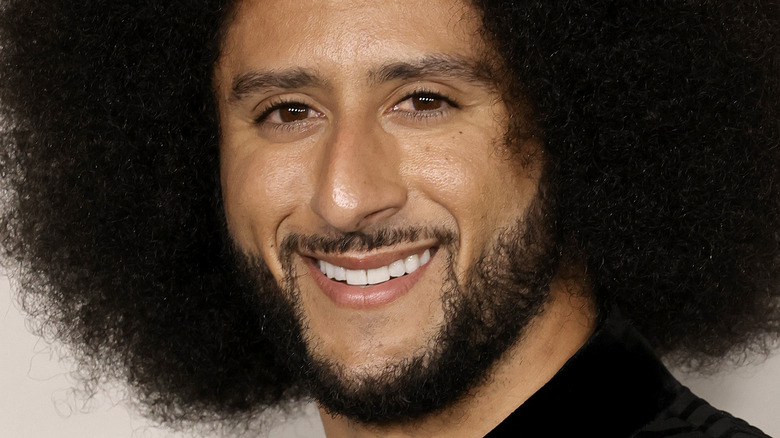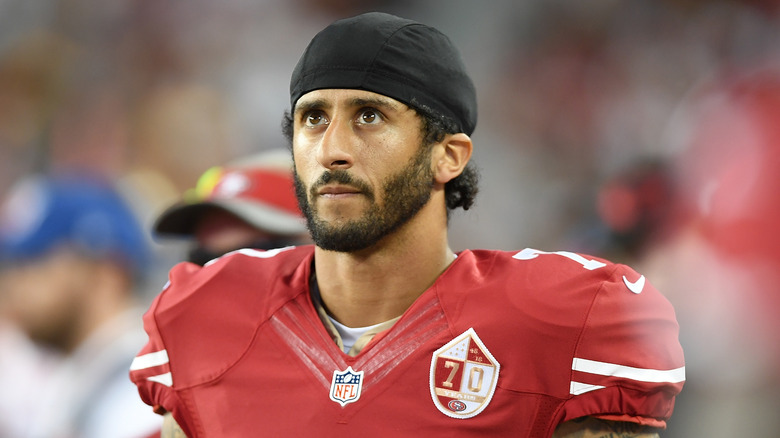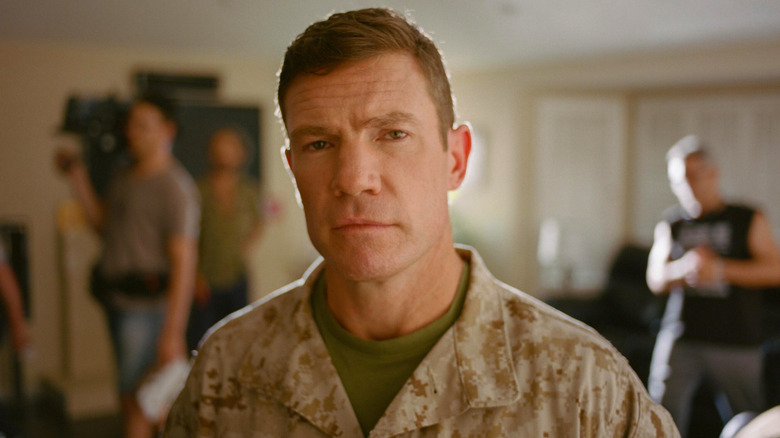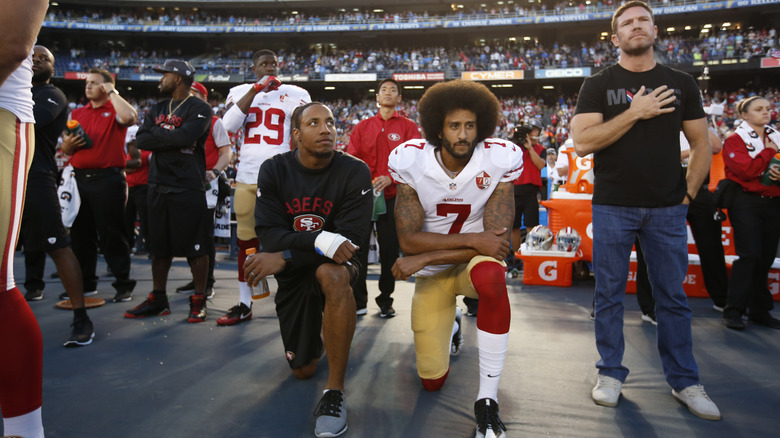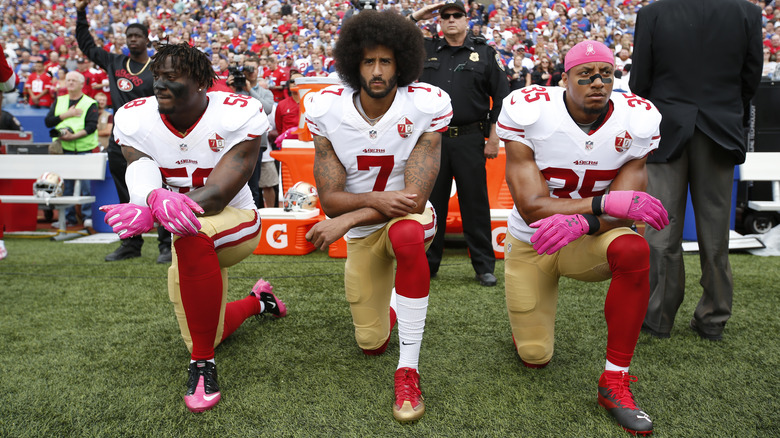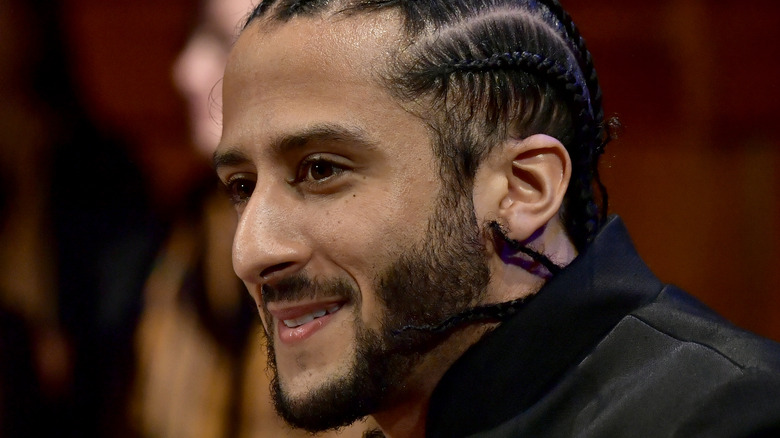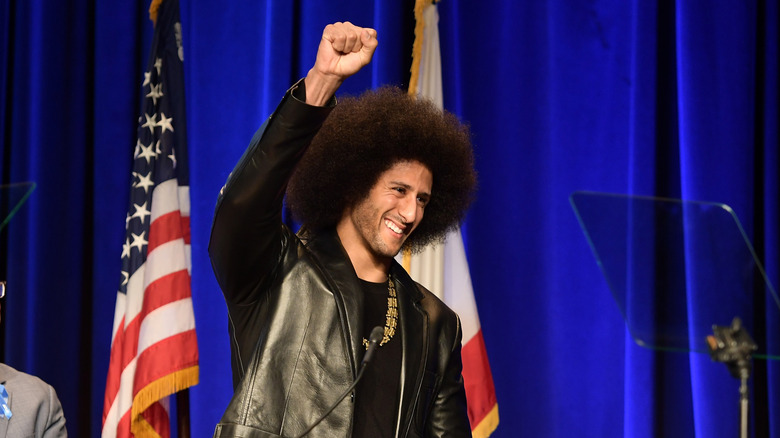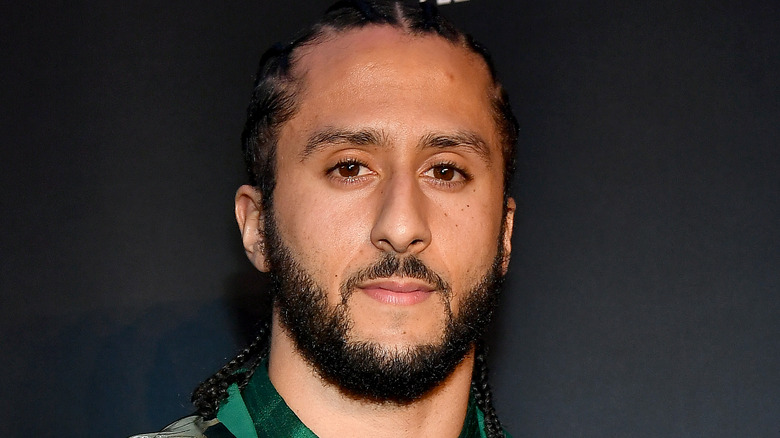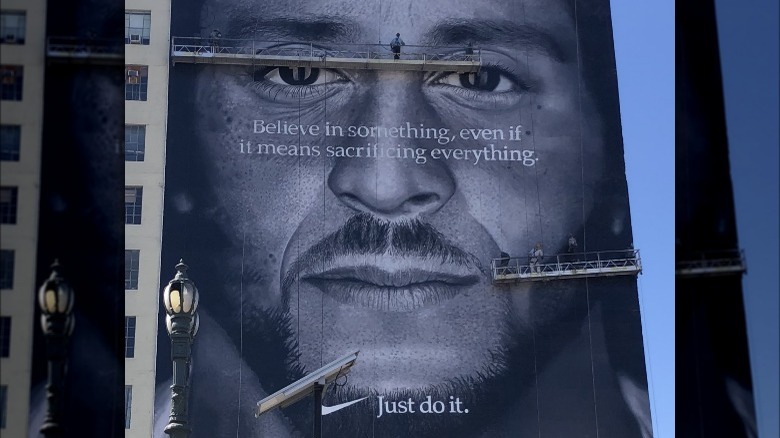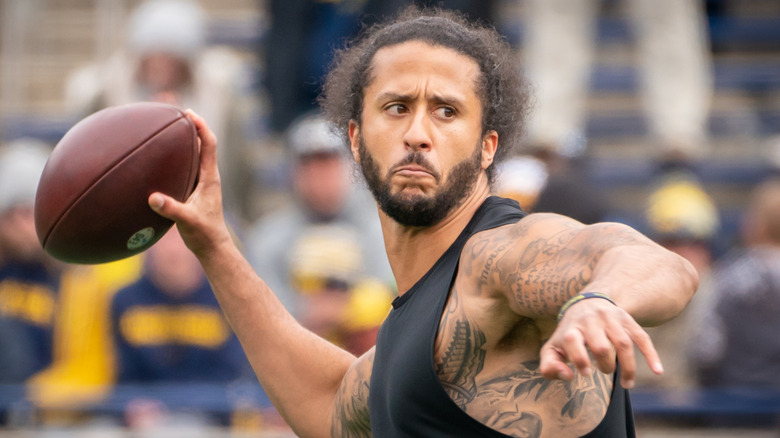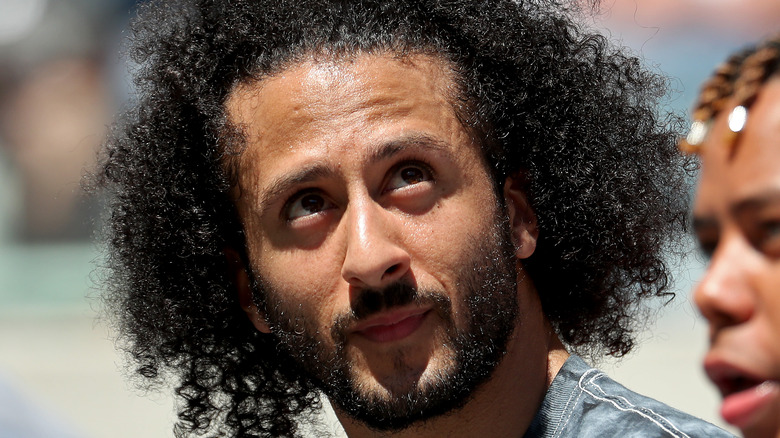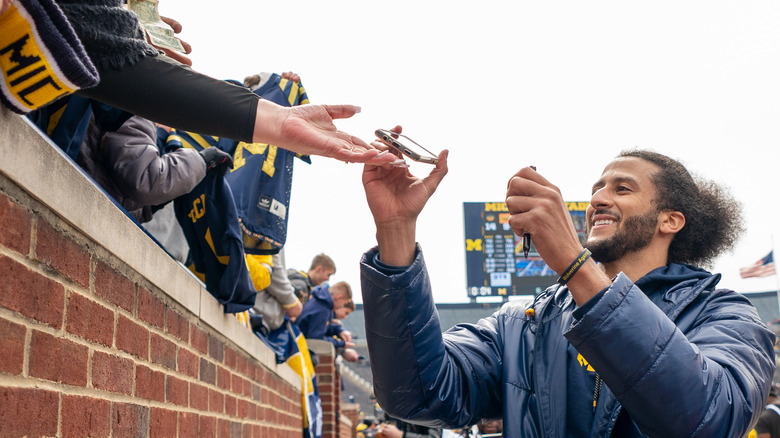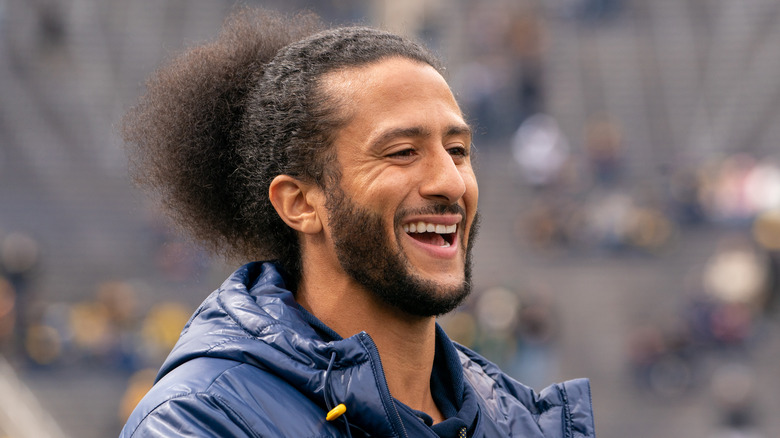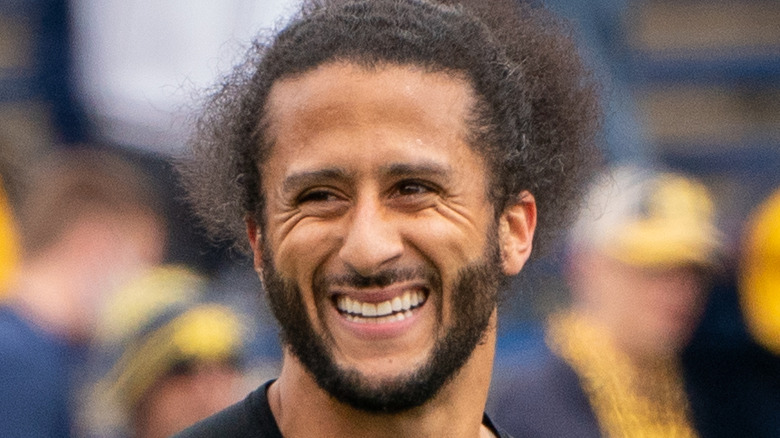Why The NFL Dumped Colin Kaepernick
For as long as he can remember, Colin Kaepernick knew he was different, and his parents made sure to remind him that was a good thing. Born to a broken household in 1987, the biracial Milwaukee native was quickly given up for adoption and welcomed into the home of Rick and Teresa Kaepernick, a white couple. "We've always been really open about the adoption, and we were always very open about the skin colors," Teresa Kaepernick said in 2010 to The New York Times. "We pointed it out as a positive, and he saw his difference and was comfortable with it."
But there was something else different about Kaepernick: He was a superlative football player. Landing a scholarship from the University of Nevada, he played quarterback for the Wolf Pack and broke several team records, prompting National Football League (NFL) franchise San Francisco 49ers to draft him in 2011. Two seasons later, he led the team to a Super Bowl appearance against the Baltimore Ravens in 2013. Despite Kaepernick amassing more passing yardage than opposing QB Joe Flacco, the 49ers still lost 34-31.
Besides elevating the 49ers up the league rankings, Kaepernick showed yet another side. He had the gumption to defy citizen protocol surrounding the national anthem in order to protest police brutality and systemic racism in the U.S. That social justice gesture not only heightened public awareness of those atrocities, it also divided the country and punted him right out of the NFL.
The quarterback stages a Star Spangled sit-down
In his prime, Colin Kaepernick was one of the NFL's best running quarterbacks. But it was for sitting that he first courted controversy. Before a 2016 preseason match against the Green Bay Packers, instead of assuming the hand-over-heart pose while standing at attention during "The Star Spangled Banner," Kaepernick chose to ride the pines. "I am not going to stand up to show pride in a flag for a country that oppresses Black people and people of color," said Kaepernick to NFL Media. The 49ers franchise seemed to be supportive, stated it recognized Kaepernick's right to sit out the anthem. Ditto for the NFL, which said, "Players are encouraged but not required to stand during the playing of the national anthem."
But NFL Media reporter Steve Wyche warned that Kaepernick ran the risk of reprisal, as had other athletes who took what some viewed as an unpatriotic stand. Wyche had precedence supporting his prophecy, citing backlash over a similar gesture by pro basketball player Mahmoud Abdul-Rauf. Still, controversy surrounding dissident athletes is nothing new. In 1967, boxer Muhammad Ali was suspended from his sport after refusing to serve in the Vietnam War, a ruling that the Supreme Court overturned four years later. During the 1968 Mexico City Olympics, two American podium finishers raised their fists in a Black Power salute, risking expulsion from the Games, and upon their return home, being called racial slurs and accused of betrayal by those who viewed their actions as unpatriotic.
Kaepernick gets advice from a former Green Beret
Throughout the rest of the preseason rounds in 2016, Colin Kaepernick was mercilessly hounded for his refusal to stand for the national anthem before the opening kick-off. While the quarterback had never previously been vocal about social issues, in an ESPN interview, he said his public perspective was long overdue. Recalling a time back in college when police drew guns on him and his roommate when both were the only Black men in the vicinity, Kaepernick said, "I have experienced this. People close to me have experienced this ... So this is something that needs to be addressed."
Kaepernick asked for input from colleagues and other professionals, including Dr. Harry Edwards, a sports sociologist who advised athletes John Carlos and Tommie Smith on how to conduct their infamous Black Power protest at the 1968 Mexico Olympics. But one unlikely source, former Green Beret Nate Boyer ꟷ who previously wrote Kaepernick a reluctant letter of support ꟷ provided him with a solution on how to take his protest further. "I suggested him taking a knee instead of sitting even though I wanted him to stand, and he wanted to sit," said Boyer to NPR. "And it was, like, this compromise that we sort of came to. And that's where the kneeling began." When the two met in September 2016, Boyer dispensed that advice, just hours away from San Francisco's exhibition game against the San Diego Chargers.
It was a day football fans wouldn't forget.
Colin Kaepernick's first knee sparks blowback
The 49ers may have won their last preseason game against the hometown Chargers in 2016, but what stuck out the most was Colin Kaepernick kneeling during the national anthem. For the rest of the game, Kaepernick was booed every time he touched the ball. A few days later, NFL Commissioner Roger Goodell spoke about the incident, saying to Associated Press that he wasn't on board with Kaepernick's protest. "I support our players when they want to see change in society, and we don't live in a perfect society," Goodell responded via email. "On the other hand, we believe very strongly in patriotism in the NFL."
Former New Orleans Saints QB Drew Brees at the time also deplored Kaepernick's protest method, telling ESPN, "... there's plenty of other ways that you can do that in a peaceful manner that doesn't involve being disrespectful to the American flag." Minnesota Vikings guard Alex Boone wasn't as cordial, telling USA Today that Kaepernick "should have some [expletive] respect for people who served, especially people that lost their life to protect our freedom."
As the season went on, the boos and the heckling continued, but within a month of his first knee protest, Kaepernick revealed he was also receiving death threats for his stance. "I knew there were other things that came along with this when I first stood up and spoke about it," he said to Mercury News. "It's not something I haven't thought about."
More NFL players start to follow Kaepernick's lead
The kneeling protest to raise awareness of violence against African Americans certainly garnered more than Colin Kaepernick's share of adversaries across the league, as well as in and out of the bleachers. Still, the naysaying didn't deter the star QB from his objective, including a benevolent fund startup. In a Niners Nation release, Kaepernick announced plans to dedicate $1 million of his salary to communities in need.
In turn, the 49er was also gifted with a growing contingent of colleagues supporting him. According to CNN, the first to join in was teammate Eric Reid, who kneeled beside Kaepernick on that momentous occasion September 1, 2016. Later, other 49ers like Antoine Bethea and Eli Harold joined the fray by raising their fists when "The Star Spangled Banner" played. So did Los Angeles Rams players Kenny Britt and Robert Quinn. Even U.S. national women's soccer player Megan Rapinoe followed Kaepernick's lead.
But those who joined in found themselves embroiled in other situations. The Miami Herald reported in September 2016 that when a slew of Miami Dolphins players started their own protests during the national anthem, the police union representing team-sponsored Broward County deputies put its foot down. The union asked the deputies to stop escorting the team to the field before games until every Dolphin player agreed to stand for "The Star Spangled Banner." In Beaumont, Texas, the situation was much scarier when ABC reported that members of a youth football team had received death threats for supporting Kaepernick's protest.
He leaves the 49ers and becomes a free agent
Throughout the 2016-2017 NFL season, support for Colin Kaepernick's cause grew, while his career was on shaky ground. Four years after San Francisco made it to the Super Bowl, the team wound up with a dismal 2-14 record, compelling the team to replace its head coach with veteran Kyle Shanahan and deal with Kaepernick, who still had a year left on his contract. After losing his starting job, Kaepernick had to weigh his options while still under contract. The team offered him a guaranteed $2.5 million, and he could choose to become a free agent a year early. But he never received an offer aside from an ill-fated backup quarterback workout with Seattle in March 2022 and another workout with the Raiders in May 2022. As of 2022, he hasn't played pro football since.
Kaepernick opting for free agency saved the 49ers a lot of money, given his contract extension in 2014 was worth $115 million (per NBC Sports), but his personal stats during that disastrous season were still admirable, with 16 touchdowns and hitting 59.21% in pass completions. But as it turned out, if Kaepernick decided to stay, team owner John Lynch told NBC Sports the quarterback was going to be cut anyway, since his scrambling style didn't fit plans drawn up by the new coach. "[Shanahan] preferred to run the exact offense that he ran in Atlanta last year that was record-breaking in this league," said Lynch. "And if you change it for the quarterback, you change it for everybody on that offense." To Kaepernick, neither option would have been a win-win proposition.
The protest turns political
In 2017, and for the first time in six seasons, Colin Kaepernick was a non-factor in the NFL standings. It also looked like his controversial protest was losing traction, until U.S. President Donald Trump weighed in. "Wouldn't you love to see one of these NFL owners when somebody disrespects our flag to say, 'Get that son of a b***h off the field right now?'" Trump declared during a rally in Huntsville, Alabama. "He's fired! He's fired!" Trump devotees erupted in cheers, although his remarks seemed odd since Kaepernick hadn't played an NFL game in almost a year. But given that this was the same politician who only weeks earlier defended "alt-right" protesters at a deadly Charlottesville rally on grounds that "not all of those people were neo-Nazis," it was like throwing red meat into a ravenous mob. Fellow Republicans joined the fray, including Sen. Ted Cruz who tweeted "Here's a peaceful protest: never buy another shoe, shirt, or jersey of rich spoiled athletes who dishonor our flag."
Players on the Dallas Cowboys started locking arms and kneeling at games in response. "That was a clear shot at Trump," said player Dez Bryant, per CNN. In a show of solidarity, other teams like the Baltimore Ravens, Jacksonville Jaguars, and Pittsburgh Steelers also joined in, per ABC. But while player support seemed to vindicate Kaepernick, the former NFL athlete was still unable to land a job.
Colin Kaepernick files grievance against the NFL
It was one thing for Colin Kaepernick to feel dejected after failing to land a job with another NFL team and lose out to an ill-fated prospect after a tryout with Seattle. But it was another thing for him to see fellow QB free agents of similar caliber — like Nick Foles, Mike Glennon, E.J. Manuel, and Geno Smith – get signed in 2017, while Kaepernick remained unemployed.
In October 2017, the situation prompted him to file a grievance against the league and its team owners, stating that they "colluded to deprive Mr. Kaepernick of employment rights in retaliation for Mr. Kaepernick's leadership and advocacy for equality and social justice ..." The following August, league system arbitrator Stephen Burbank denied the NFL's application to dismiss the case, a decision that Mark Geragos, the athlete's lawyer, happily tweeted. By March 2019, Kaepernick finally settled with the league, reaching an agreement that also involved plaintiff and former teammate Eric Reid for a sum of less than $10 million, according to The Wall Street Journal.
Before the Burbank ruling, the NFL tried to eliminate another Kaepernick element, namely the rampant player protests at games. In 2018, Commissioner Goodell and team owners unanimously approved a policy that players could remain in the locker rooms while the anthem played, but needed to stand when on the field, per ESPN. But when the league's players association challenged the policy, both parties agreed to put the decision on hold.
Colin Kaepernick becomes the face of Nike
Still unemployed, Colin Kaepernick was hardly idle, making good on his personal mission to fund needy communities with his Million Dollar Pledge campaign and launching free workshops called Know Your Rights, accessible on his personal website. The former NFL star also made headlines in September 2018 when he renewed an old 2011 deal with Nike, this time worth millions. "Colin Kaepernick is back — at least as far as Madison Avenue is concerned," declared ESPN, which initially broke the story on Twitter, revealing its poster image featuring a Kaepernick close-up and the slogan "Believe in something. Even if it means sacrificing everything." Nike reportedly felt Kaepernick's message of fighting racial injustice had inspired legions in (and out of) the sporting sector to the point where it made sense to include his campaign in the company's branding. "We wanted to energize its meaning and introduce 'Just Do It' to a new generation of athletes," said Gino Fisanotti, Nike's branding vice-president.
While the reception to the Nike news was largely favorable, according to Associated Press, blowback came from football fans who opposed Kaepernick's protests and threatened to not only boycott Nike, but also cut the company logo out of apparel they had already purchased. President Donald Trump, who frequently railed against NFL players protesting during the national anthem, said the Nike deal sent a "terrible message." Still, the sports shoe and clothing company benefited hugely from the deal, reported Black Enterprise. By November 2019, Nike's value had jumped by $26 billion.
NFL agrees to a workout assessment for Colin Kaepernick
Now subsidized with a Nike deal and a grievance settlement, Colin Kaepernick no longer needed QB income, but he still wanted to specifically rejoin the NFL. He could have gone to the Canadian Football League, which fostered the careers of NFL greats from Doug Flutie to Warren Moon. One of its franchises, the Montreal Alouettes, had the CFL rights to Kaepernick, but he wasn't interested (per Niners Nation). In an October 2019 statement released via Twitter, the player's agent Adam Schefter said Kaepernick was ready for a comeback, having undergone daily workouts the past three years.
Finally, the NFL agreed to a one-day Kaepernick workout and interview session in Atlanta in November 2019, inviting personnel from all 32 teams to attend. "We have therefore arranged this opportunity for him to work out, and for all clubs to have the opportunity to evaluate his current readiness and level of interest in resuming his NFL career," said the NFL in a memo (per ESPN). However, Kaepernick's camp was concerned about the extremely short time frame between being notified of the workout and the actual workout, particularly with it being scheduled on a Saturday, not Tuesday, when more personnel could easily attend. Afterward, the NFL and Kaepernick's representatives locked horns over issues that included media availability, and Kaepernick moved the workout from a league-sanctioned venue to another spot at the last minute. According to ESPN, members from only eight franchises were able to catch the workout.
The NFL backpedals on Kaepernick's protests
A tragedy in Minneapolis on May 25, 2020, cast a more vivid light on what Colin Kaepernick was protesting when a law enforcement officer killed a Black man named George Floyd in broad daylight. Almost immediately, outraged Americans took to the streets in protest. Ten days later, 18 Black NFL players assembled a video for social media pushing the NFL to condemn racism and lend more support to visible minority athletes in the league. "How many times do we need to ask you to listen to your players?" asked one athlete on the tweeted video, directed at the league. "We will not be silenced. We assert the right to peacefully protest," added others.
The next day, NFL Commissioner Roger Goodell responded by tweeting an admission on video. "We, the NFL, admit we were wrong for not listening to NFL players earlier and encourage all to speak out and peacefully protest," said Goodell, adding condolences for families affected by police brutality and condemning systemic racism in the country. What the commissioner didn't offer was an apology to Kaepernick. That didn't happen until late August, when he appeared on "Uncomfortable Conversations with a Black Man," a YouTube podcast hosted by former NFL player Emmanuel Acho. "I wish we had listened earlier, Kaep, to what you were kneeling about and what you were trying to bring attention to." Goodell said, adding regret that the two never had a dialogue on the issue.
Where the NFL and Colin Kaepernick stand today
Following NFL Commissioner Roger Goodell's admission over failing to legitimize the protests of its players, and an apology for ignoring Colin Kaepernick, the league embarked on a number of initiatives to address the issue of systemic racism in America. In 2020, the NFL announced plans to create a $250 million fund to combat injustices plaguing African Americans for the next 10 years. Before the league revealed the initiative, it had already dedicated $44 million to a number of programs, from hundreds of grassroots organizations earmarked by players to national social justice partners. Kaepernick slammed the campaigns, using former teammate Eric Reid ꟷ who was traded to Carolina before the team dumped him into free agency purgatory ꟷ as an example. "While the NFL runs propaganda about how they care about Black Life, they are still actively blackballing Eric Reid ... for fighting for the Black community," he tweeted.
In 2021, Kaepernick collaborated with Netflix, which ushered in "Colin in Black and White," a docudrama covering his exposure to racism before joining the NFL. Meanwhile, the 30-ish Kaepernick still sticks to a rigorous workout schedule with hopes of grabbing a gig, so he can finish what he started: not just appearing in a Super Bowl, but winning it. "I want to win a championship and I know that may take different paths to get there," he said on the "I Am Athlete" podcast, "but I wholeheartedly believe, so I'm gonna make that happen."
Was Kaepernick blacklisted by the NFL?
Since Colin Kaepernick's departure from the NFL, debate continues over whether he was blackballed by the league. The evidence is circumstantial at best, since Kaepernick was never charged by the league for his protests; he was fined only once, for $11,000 for "inappropriate language" during a 2014 game. While free-agent quarterbacks in 2017 were quickly getting signed, save for Kaepernick, an NFL statement cited Commissioner Goodell as saying "all the clubs, individually, have to make their own decisions about who's on the roster, who's not on the roster." Still, curiosity might have piqued over the NFL's culpability in any alleged collusion with its franchises after the arbitrator threw out the league's request to dismiss Kaepernick's complaint rather than have the proceedings move toward a hearing. That the NFL and Kaepernick reached a settlement less than four months later is also peculiar, given the complaint was already a year old before the NFL's dismissal request was rejected.
While no smoking gun exists to support Kaepernick's complaint, that 32 teams ꟷ including a few franchises that could have benefited from the free agent's services ꟷ didn't sign him also smacks as odd. But in April 2022, Las Vegas Raiders owner Mark Davis spoke out on the NBC Sports program "Race In America," saying he'd welcome Kaepernick to the team. "He deserves every chance in the world to become a quarterback in the National Football League," said Davis. At this writing, however, Kaepernick remains unsigned.
Is a Colin Kaepernick comeback in the works?
As of this writing, Colin Kaepernick hasn't played in an NFL game since 2016. According to Sports Illustrated, the Baltimore Ravens backed away from signing the outspoken quarterback in 2017 after deciding it was too soon to bring on such a controversial figure. (As previously mentioned, the Seattle Seahawks also took a pass on Kaepernick.) At age 34, likely nearing what could be the end of his period of professional football viability, Kaepernick was ready for one more shot in the NFL; according to a tweet from the man himself, he'd stayed in shape and kept up with training and passing drills.
In May 2022, per ESPN, the Las Vegas Raiders acted on the advice of the NFL, who told teams to give some thought to the long dormant QB, and brought in Kaepernick for an offseason workout. Team owner Mark Davis previously told ESPN in 2020 that if Raiders coaches or executives wanted to sign Kaepernick, he'd give it his "blessing." The athlete also had a connection to the team in Raiders offensive coordinator Mick Lombardi, an assistant for the San Francisco 49ers when Kaepernick played there in the mid-2010s.
The Raiders didn't publicly reveal much about the workout, according to TMZ Sports, although ex-NFL star lineman Warren Sapp alleged to VladTV that the workout didn't go so swimmingly. "I heard it was one of the worst workouts ever," Sapp said. "... The tape didn't get out, right?" Responding to this claim, Jeff Nalley – Kaepernick's agent — told ProFootballTalk that his client showed true prowess and promise.

